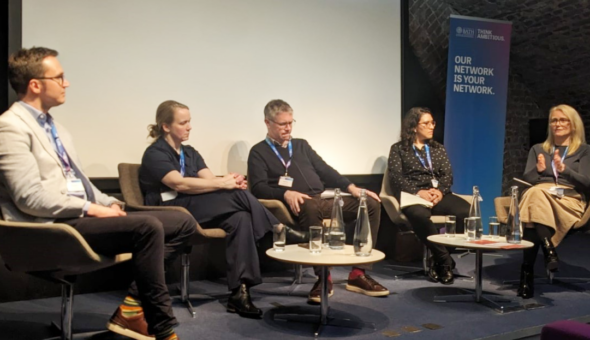Andrew Crane, Michael Rogerson, Vivek Soundararajan, Johanne Grosvold, and Charles Cho discuss their latest research which finds that UK universities are unable to make meaningful progress in preventing some of the worst kinds of worker exploitation in their supply chains.
UK universities spend billions of pounds annually on a wide variety of goods and services such as food, electronics, lab supplies, and campus-based construction projects, all sourced from industries known to have a high risk of modern slavery. According to latest estimates, more than 40 million people are thought to be in situations of modern slavery, defined by the ILO as “situations of exploitation that a person cannot refuse or leave because of threats, violence, coercion, deception, and/or abuse of power.”
In the case of electronics, for example, thousands of workers are known to be enslaved in the sourcing of raw materials and production of components for computers, laptops, tablets, and other gadgets that grace the desks of every staff member and student on campus. This means that universities (and their staff and students) are benefitting from the appalling exploitation of workers along the supply chains of the products they purchase on a regular basis.
Under the 2015 Modern Slavery Act, universities with a revenue in excess of £36m, are required to report annually on what they have done to address modern slavery risks across their supply-chains. To comply with the Act, universities must post a statement on their web site’s homepage, signed by a board member, which states what they have done in the previous year to address the issue of modern slavery. In 2019, an estimated 29% of qualifying universities had complied with this reporting requirement, compared with 23% of qualifying private-sector organisations.
Compliance with the act does not necessitate action. Universities can be in compliance with the Act even if they have done nothing as long as their modern slavery statement reflects this. However, the spirit of the law, and the logic that underpins the reporting requirements of the Modern Slavery Act, is that this increased pressure for improved transparency will expose organizations to greater accountability and scrutiny – and push them towards providing better protection for highly vulnerable workers.
Our research – based on interviews with procurement staff from more than a quarter of UK universities within the scope of the Act – reveals that universities have been, and will continue to be, more poorly placed than their counterparts in the private sector to manage modern slavery well enough to eradicate modern slavery practices in their supply-chains. This is because universities lack three key ingredients which are required to move from transparency to actual improvements in practice.
First, universities lack sufficient board accountability on the issue of modern slavery. While someone at board level is required to sign off a modern slavery statement, most senior university executives lack any real knowledge or interest in the issue, and there is a lack of senior-level leadership for the university’s modern slavery performance.
Second, universities don’t have sufficient supply chain management capabilities. An unintended consequence of decades of pressure to rationalize and reduce expenditure have left university purchasing departments with limited resources or expertise in checking their suppliers. They have ended up outsourcing much of their procurement activity to purchasing consortia that act on behalf of groups of universities, leaving purchasing staff with reduced direct oversight over their suppliers. Although this reliance on purchasing consortia has kept costs down and contributed to value for money in purchasing, it has resulted in what is now a lack of skills to better address the issue of modern slavery in supply chains.
And third, universities simply lack appropriate incentives to differentiate from their competitors with respect to their modern slavery activities. The reporting requirements of the Modern Slavery Act have been mainly designed for companies that, in principle at least, are in fierce competition with each other. Universities, however, have been more concerned with helping each other out and sharing information on how to respond. Many of their modern slavery statements are indistinguishable from one another and whole swathes of the sector collaborate in producing them. Although this has helped improve basic compliance across the sector, it has also prevented any real attempt raise the bar in order to outdo one another.
What all this means is that if modern slavery is happening in university supply chains – and many procurement staff admit it is likely – universities are unlikely to know about it, and still less likely to be able to actually address the issue. It is not so much a problem of a lack of willingness – the sector is filled with hard working professionals who would want to do the right thing, many of whom are frustrated at their own organisation’s inability or unwillingness to do what is required. But rather, in contrast to many private sector companies, the purchasing structures of UK universities are simply not designed in a way that enables them to tackle modern slavery effectively – and the Modern Slavery Act is ill-designed to make much of a difference in prompting improvements.
Without either a change in the approach to regulating modern slavery in universities, or a major shift in university management’s approach to the issue, performance issues look set to prevail.
Respond



